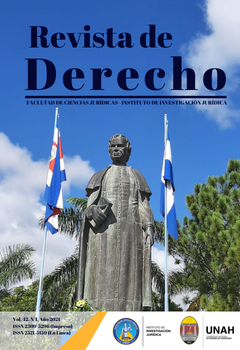Un Bicentenario de Esclavitud Femenina: Análisis de 200 Años de Evolución Jurídico-Penal en Honduras
DOI:
https://doi.org/10.5377/lrd.v42i1.12929Palabras clave:
Esclavitud, género, trata de personas, legislación penal, bicentenarioResumen
La explotación humana ha acompañado la evolución de la humanidad misma a través del tiempo. A pesar de ser una práctica abolida y prohibida a todos los niveles, en realidad ha sido capaz de adaptarse a cada época, incluso en Honduras. Por esa razón, bajo una óptica jurídica, el presente trabajo de investigación resume y analiza el desarrollo normativo hondureño desde la época post-independentista hasta el 2021, con el fin de verificar la armonización del estamento jurídico nacional con los avances del derecho internacional de los derechos humanos y el feminismo a nivel mundial. Este estudio identifica los principales vacíos legales en la normativa vigente, en aras de propiciar el debate sobre la explotación femenina, mejorar el marco jurídico actual y promover reformas encaminadas a garantizar una protección más adecuada para las mujeres.
Descargas
497
Descargas
Publicado
Cómo citar
Número
Sección
Licencia
En caso de superar el proceso editorial y un artículo sea considerado para su publicación, La revista de Derecho de la Universidad Nacional Autónoma de Honduras será titular de los derechos patrimoniales con relación a su reproducción, distribución, comunicación pública y transformación. En cuanto a los derechos morales del artículo en mención, estos le pertenecerán directamente al autor o autores del mismo.
© Instituto de Investigación Jurídica
La Revista de Derecho opera bajo la licencia Creative Commons Attribution-NonCommercial 4.0 International License




